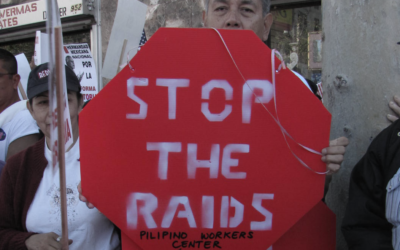Due Process and the Courts
What does the constitution say about due process?
The Fifth Amendment to the Constitution says clearly that no person shall be deprived of life, liberty, or property without the due process of law. Note that this says person, not citizen, and over the years the Supreme Court has consistently ruled that the Due Process Clause applies to all people in the United States.Do non-citizens have the right to due process in the U.S.?
Yes. The Constitution guarantees due process rights to all "persons," not just citizens. This means non-citizens, including undocumented immigrants, are entitled to fair treatment under the law. This includes the right to defend themselves in court. But recent Trump administration policies that speed up deportations and limit access to legal representation make it harder for non-citizens to get their fair day in court.- Access to legal representation Access to legal counsel is an essential part of our justice system and our democracy. In the criminal justice system, anyone facing even one day in jail gets a lawyer if they can't afford one. But immigrants facing deportation usually don't get that chance.The research is clear – the most effective way to ensure some level of due process for people navigating our complicated immigration system is for them to have trained attorney at their side. But Trump administration is now working to strip attorneys from as many people as possible, all in the name of increasing its deportation numbers. This attempt to eliminate basic due process will hurt people who already have few options.
- Fair day in court Due process guarantees that individuals have the opportunity to defend themselves in court. This includes non-citizens facing deportation.
Why is due process important?
We are seeing right now the importance of due process when it comes to President Trump's actions to carry out the so-called Alien Enemies Act, a 1798 wartime law that permits people to be deported outside of the normal framework of immigration law. President Trump has alleged that this law allows him to simply point at any person, declare them to be an alien enemy, and kick them out of the country without ever having a chance to see a judge. Thankfully, the Supreme Court said that is not true, and in a unanimous decision, ruled that people can challenge the Trump administration's invocation of the Alien Enemies Act. That is why due process is so important, because it means that no person can be rounded up and sent to another country without a chance to go to court and make the government prove their case.How is the American Immigration Council working to protect due process?
- We serve thousands of individuals in immigration detention centers through the Immigration Justice Campaign, our initiative with the American Immigration Lawyers Association. The Justice Campaign provides free legal services for immigrants who would otherwise have to navigate our complicated immigration system without a lawyer.
- We use the courts to demand a fair process for immigrants. Our litigation team is fighting back against the Trump administration’s blatant disregard for due process including filing a lawsuit challenging their illegal detention of immigrants in El Salvador’s notorious Terrorism Confinement Center (CECOT).

Government Sued For Withholding Records on Immigration Raids
The Department of Homeland Security (DHS) is continuing to defend the controversial “Operation Border Guardian” program that took more than 100 Central American women and children from their homes in two days of immigration raids last January. According to a lawsuit filed this week by the Southern Poverty Law… Read More

Court of Appeals Strengthens Government Transparency
An appellate court has ruled for an immigration group in a lawsuit against the Executive Office for Immigration Review (EOIR) challenging its response to a request for information regarding alleged misconduct by immigration judges and records that would reveal whether the agency adequately investigates and resolves complaints against immigration judges. Read More

Fifth Circuit Finds Motions to Reopen Can Be Equitably Tolled
The decision strongly reaffirms the importance of immigrants’ statutory right to file a motion to reopen, a procedural protection meant to ensure a proper and lawful outcome in an immigration proceeding. Read More

Supreme Court Issues Disappointing Split Decision in United States v. Texas
Washington D.C. – Today, the Supreme Court issued a 4-4 decision in United States v. Texas, the case challenging expanded Deferred Action for Childhood Arrivals (DACA) and Deferred Action for Parents of Americans and Lawful Permanent Residents (DAPA). This means that the Fifth Circuit’s decision upholding the preliminary injunction against these… Read More

Lawsuit Seeks to Shed Light on Customs and Border Protection’s Complaint Process
Washington D.C. – The American Immigration Council (Immigration Council), represented by Drinker Biddle & Reath LLP, today filed a lawsuit under the Freedom of Information Act (FOIA) to compel the release of additional documents related to the complaints process at United States Customs and Border Protection (CBP). Through this suit, the Immigration Council… Read More

Court Rejects Government Attempt to Redact Names of Immigration Judges
This summer, the District of Columbia Circuit Court of Appeals ruled in favor of the American Immigration Lawyers Association (AILA) in its lawsuit seeking the disclosure of unredacted versions of complaints filed against immigration judges. To date, the government has refused to turn over the names, locations, and genders… Read More

Background on Judicial Review of Immigration Decisions
“Judicial review” refers to federal court review of an immigration agency decision. Some individuals whose immigration benefits applications are denied or who are ordered removed from the United States may seek judicial review. However, the immigration law contains many technical barriers to accessing the federal courts, including inflexible restrictions on… Read More

Court Rules that Individuals Seeking Protection Must Have Bond Hearing
The Second Circuit Court of Appeals in New York issued an important decision in July recognizing certain noncitizens’ right to a bond hearing before an immigration judge. It was a victory not only for the petitioner, a Guatemalan man seeking protection in the United States, but also will likely… Read More

FOIA Documents Reveal Government Always Knew Flores Settlement Applies to All Children
The Ninth Circuit Court of Appeals recently ruled that the 1997 settlement in Flores v. Reno—which governs the detention, treatment and release of immigrant children—covers both unaccompanied and accompanied minors. This was a direct repudiation of the position the government took while defending its family detention policies in… Read More

Despite Immigration Judge Hiring, Court Backlogs Continue to Grow
The latest figures show that the number of cases pending in immigration court continue to grow. According to the Transactional Records Access Clearinghouse (TRAC), there were 496,704 cases in the backlog as of the end of March. This is almost 40,000 more pending cases than Executive Office of Immigration… Read More
Make a contribution
Make a direct impact on the lives of immigrants.
